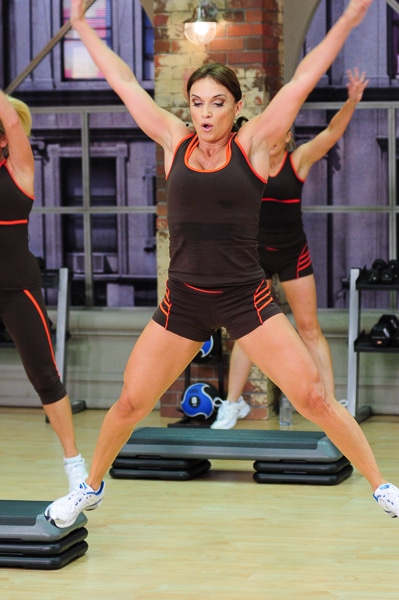
How Caffeine Boosts Exercise Endurance
In a study published in the Journal of Applied Physiology, participants that consumed caffeine (9 mg of caffeine per pound of body weight) were able to run at 85% of their V02 max longer compared to those that took a placebo.
How does caffeine increase endurance? Caffeine increases epinephrine levels during exercise. When epinephrine levels increase, your body mobilizes more fat to be used for fuel. This spares muscle glycogen so muscles have more glycogen stores available to sustain exercise. This prolongs time to fatigue. If you’re a runner or cycler, sipping caffeinated coffee beforehand may increase your endurance – but be prepared! You may have to stop more frequently to “relieve yourself” more due to the diuretic effects of caffeine.
Caffeine and High-Intensity Exercise Performance
Caffeine seems to improve exercise endurance during moderate-intensity endurance exercise – but what about short bouts of high-intensity exercise like high-intensity interval training? It’s less clear whether caffeine improves performance under these circumstances. In a meta-analysis of 28 studies, 17 of them showed caffeine improves high-intensity exercise performance. It seems to be more effective in trained athletes that consume a moderate amount of caffeine and aren’t habitual users of caffeine. There seems to be some attenuation of the benefits if you use caffeine on a regular basis.
How might caffeine improve high-intensity exercise performance? Higher doses increase the force of muscle contractions, possibly by stimulating more calcium release from the sarcoplasmic reticulum of muscle cells. It also may make muscle fibers more sensitive to calcium.
Another way caffeine seems to improve performance during high-intensity exercise is by blocking adenosine receptors in the brain that promote relaxation. By blocking these receptors caffeine has an activating effect, increasing alertness and reaction time. This works in your favor if you’re doing a vigorous workout.
If you’re doing high-intensity exercise to lose body fat, caffeine offers another benefit. High-intensity exercise produces an after-burn effect where your metabolic rate stays higher after an intense exercise session. Caffeine seems to potentiate this effect. That means you’ll burn more calories after a high-intensity workout when you have caffeine on board. In addition, caffeine may enhance high-intensity exercise performance by making a workout feel easier.
Caffeine and Exercise: Should You Consume Caffeine Before a High-Intensity Workout?
There are some potential drawbacks to sipping caffeinated coffee before a high-intensity workout. A study published in the American College of Cardiology showed as little as two cups of caffeinated coffee prior to exercise reduce blood flow to the heart during exercise by 22%. A reduction in blood flow and oxygen could lead to lightheadedness or dizziness and may pose problems for people with heart disease or hypertension.
How Much Caffeine Do You Need to Boost Exercise Performance?
Research suggests you need between 1.5 and 4 milligrams of caffeine per pound of body weight to get the benefits. A person that weighs 150 pounds can get that by drinking 1.5 to 4 cups of drip coffee about an hour before exercising. Drip coffee has around 150 milligrams of caffeine per 8-ounce cup.
Caffeine isn’t for everyone. Everyone responds to it a little differently to it. Caffeine can cause nervousness and anxiety, especially if you aren’t accustomed to drinking it. Research also suggests you get the most benefits if you’re a trained athlete who doesn’t regularly drink caffeine.
Some people appear to be exquisitely sensitive to even small amounts of caffeine. This is more common in older people, women and those with a low body weight. In addition, certain medications can amplify the effects of caffeine. If you have certain medical conditions like high blood pressure, heart disease or an overactive thyroid, it’s best to avoid caffeine entirely
The Bottom Line?
Caffeine does appear to increase exercise endurance during longer periods of exercise but how effective it is at increasing performance with short-term, high-intensity exercise is less certain. It increases the force of muscle contractions and boosts alertness, both of which should be of benefit. Balance this with the side effects of consuming caffeine when deciding whether it’s right for you. Most importantly, make sure you’re not carb-depleted before high-intensity exercise. That’ll definitely make your workout more challenging.
References:
J. Appl. Physiol. 1991; 71: 2292-2298.
J Nutr Sci Vitaminol (Tokyo). 2001 Apr;47(2):139-46.
J Strength and Conditioning Research 24(1):257-65.
J Am Coll Cardiol. 2006;47(2):405-410. doi:10.1016/j.jacc.2005.08.064.
Journal of Applied Physiology November 1, 2000 vol. 89 no. 5 1719-1724.
Related Articles By Cathe:
Can Music Make High-Intensity Interval Training More Effective?
Why Caffeine after a Workout Has Potential Benefits
How Much Can Caffeine Improve Exercise Performance? It Depends on This
Can Drinking Coffee Before a Workout Make Exercise More Enjoyable?
New Research Shows How High-Intensity Exercise Helps You Get Fitter
Should You Drink Coffee Before a Workout & If So, When?

